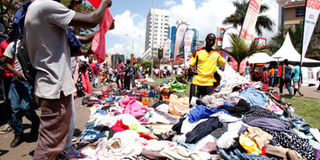Prime
Taxes on used clothes will stimulate jobs, local textile industry - activists

Traders display second-hand clothes on one of the streets
Kampala- The proposed tax on used clothes and removal of tax on farm inputs will spur the growth of local textile industry and create thousands of jobs, civil society organisations have said.
Mr Julius Mukunda, the coordinator Civil Society Budget Advocacy Group, said discouraging imports through punitive taxes will make local fabrics cheaper, thereby creating market for them.
This, he said, will translate into higher prices and demand for cotton as textile industries will demand more raw materials to increase their production for the available market.
“We should have had these taxes long time ago. If our fabrics get market locally, it will mean textile industries expanding. This will create thousands of jobs in the value chain and improve incomes of farmers,” Mr Mukunda, said Wednesday in Kampala.
On Monday, Finance minister Matia Kasaija proposed a wide range of taxes including an increase from 15 to 20 per cent of the cost of used clothes popularly known as Mivumba.
The proposed tax on Mivumba in Uganda coincides with the East African Community (EAC) proposal a few weeks ago to initiate a process of locking such clothes out of the region blamed for out-competing the local textile industries. The cotton industry is a source of income for more than 400,000 households involved in cotton production and ginning in the country, according to available data from the Trade ministry.
Cotton lint production has been fluctuating in the last eight years. In the years 2007/8 and 2009/10, production dropped below the average of 100,000 bales per annum, according to statistics from the Trade ministry.
Uganda National Bureau of Statistics figures show that Uganda produced 12,700 tonnes in 2014 and 18,671 tonnes in 2013 making the country cash in $ 31.7 million (Shs107.1 billion) to $ 21.9 million (Shs74.1 billion) respectively. The country has one of the largest integrated mills in the EAC- Nyanza Textiles Limited (Nytil) that has been in fabrics production for many years. Other industries include Phenix Logistics Ltd, and Fine Spinners which recently opened in Kampala.
Mr Bushir Mutyaba, a secondhand clothes seller in Wandegaya, Kampala, said the tax will not drive them out of business because local fabrics will remain expensive and still be making profits. “Government should first address the biting poverty which drives us into buying and selling secondhand clothes,” Mr Mutyaba said.
Another seller Shaluwa Nankya Mutebi, said: “Secondhand clothes are unique from local ones. Local manufacturers should improve quality first, “she said.
Proposed taxes
• Soft cap Shs50,000 per 1,000 sticks (cigarettes)
• Hinge lid Shs80, 000 per 1,000 sticks (cigarettes)
•Cigars, cheroots and cigarillos containing tobacco 200 per cent
• Smoking tobacco 200%
• Homogenised or reconstituted tobacco 200%
• Other 200%
• Ready to drink spirits 80%
• Cement Shs1,000 per 50kgs
• Motor spirit (gasoline) Shs1,100 per litre
• Gas oil (automotive, light, amber for high speed engine) Shs780/- per litre
• Cane or beet sugar and chemically pure sucrose in solid form Shs100 per kg
• Motor vehicle lubricants 10%
• Confectioneries (chewing gum, sweets and chocolates) 20 per cent
• Increase the rate of the environmental levy charged on used clothing, used shoes and other used articles 15 to 20%




